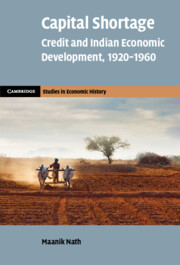Book contents
- Capital Shortage
- Cambridge Studies in Economic History
- Capital Shortage
- Copyright page
- Contents
- Figures
- Tables
- Acknowledgments
- 1 Introduction
- 2 Agriculture, Commerce and Governance in the Longue Durée
- 3 Climate and Credit
- 4 Courts and Credit
- 5 Regulating Moneylenders
- 6 Regulating Cooperatives
- 7 Credit after 1960
- 8 Conclusion
- Epilogue
- Bibliography
- Index
4 - Courts and Credit
Published online by Cambridge University Press: 08 September 2023
- Capital Shortage
- Cambridge Studies in Economic History
- Capital Shortage
- Copyright page
- Contents
- Figures
- Tables
- Acknowledgments
- 1 Introduction
- 2 Agriculture, Commerce and Governance in the Longue Durée
- 3 Climate and Credit
- 4 Courts and Credit
- 5 Regulating Moneylenders
- 6 Regulating Cooperatives
- 7 Credit after 1960
- 8 Conclusion
- Epilogue
- Bibliography
- Index
Summary
Summary: Amidst high default rates, how did moneylenders recover unpaid loans? They had two options. One was to recover loans informally through private negotiations with borrowers. The other was to execute written contracts and revert to courts to enforce these contracts. This chapter analyses the history of courts as well as land laws, contract laws and credit surveys to examine the costs incurred by lenders to enforce different types of contracts in the unregulated market. Judicial proceedings were expensive in colonial India and often exceeded the size of loans. The chapter records a loan upgrading process in which lenders attached different types of contracts depending on the stage of default and reimbursed the costs of enforcing these contracts by charging higher interest rates. For small loans in high-risk areas, enforcement was through private negotiations and conditions harsh. These findings suggest an inverse relationship between transaction costs and equity in credit markets.
- Type
- Chapter
- Information
- Capital ShortageCredit and Indian Economic Development, 1920–1960, pp. 72 - 108Publisher: Cambridge University PressPrint publication year: 2023



